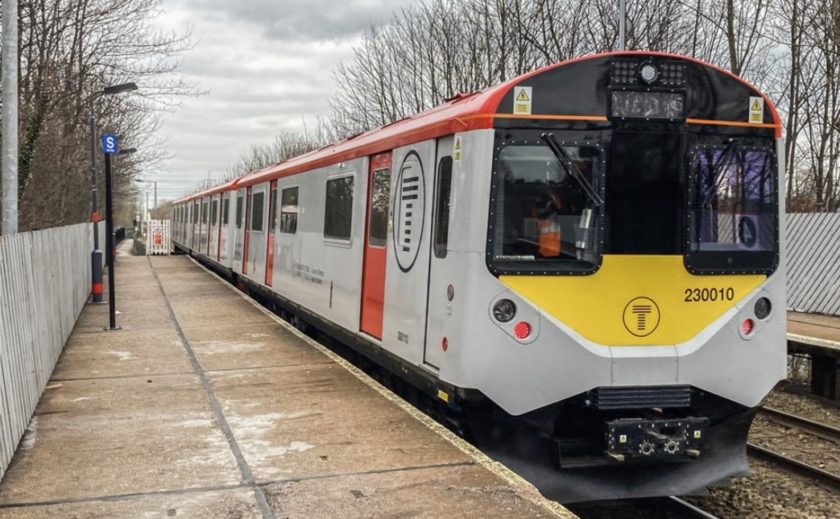Blooming Problem: Pollen blamed for causing technical issues with …

Transport for Wales (TfW) has said that one of the technical issues plaguing the Class 230 trains, which operate exclusively on the Wrexham to Bidston Line, is engine filters becoming blocked by pollen.
After months of disruptions on the Borderlands Line due to a rolling stock shortage, TfW introduced the Class 230 trains in April, four years later than initially planned.
The Class 230s are a fleet of five hybrid diesel/battery trains, utilising the bogies and aluminium bodyshells of withdrawn London Underground trains.
Despite rigorous pre-service testing and modifications, the Class 230 units have had a rocky start, contending with multiple technical issues.
These setbacks have led to challenges in reliability and maintaining the hourly schedule, resulting in daily service disruptions and cancellations on the vital route between Flintshire, Wrexham, and the Wirral.
In March, the Wrexham Bidston Rail User Association (WBRUA) expressed significant concerns about the line’s management and operation by TfW and suggested it should be handed over to Merseyrail.
Responding, the Deputy Minister responsible for transport, Lee Waters, said it is “important” the Welsh government “faces the music” over criticism of the Wrexham to Bidston railway line, as the situation for passengers in recent months has been “awful.”
Transport for Wales has now made several commitments under its ‘5 step plan’, including improving the reliability of the new Class 230 trains ‘through investment into the new depot at Birkenhead.”
Despite ongoing issues and the inability of the 230s to maintain an hourly timetable, Andrew Gainsbury, TfW’s rolling stock strategy manager, said technical problems have been “generally very minor”, with quick resolutions already in place.
Speaking to Railway Magazine[1], he said: “Several separate technical issues have been experienced since the entry into service,” said Mr Gainsbury. He added that some of these were related to staff unfamiliarity with the fleet.
However, there has been a persistent problem with pollen clogging the engine filters causing overheating, which is temporarily being mitigated by daily filter cleaning and rotating units during the day.
“This has allowed us to manage the situation this year and already the pollen seems to be subsiding,” explained Mr Gainsbury, expressing that TfW will seek a more permanent fix for next year.
Battery overheating incidents were another challenge, though Mr Gainsbury clarified that recent failures were unrelated to this.
He also assured that “significant testing” had been done before the trains entered service to validate modifications made in response to overheating experienced last year.
Furthermore, regarding the units’ inability to recover time on Wrexham-Bidston diagrams, Mr Gainsbury stated that options to improve train performance were being considered. “Staff are still familiarising themselves with the trains, which are very different from other fleets,” he explained.
According to the Railway Magazine article, four of TfW’s five Class 230s are currently available for service, with the fifth expected in the autumn after the completion of outstanding repairs.
TfW said it plans to increase services on the route in the autumn, with two Class 230s and two of the new Class 197s scheduled to work.
As part of the £50m North Wales Metro programme to “transform rail, bus and active travel services” across the region, the Welsh Government had committed to increasing the number of trains on the Borderlands Line to two per hour from May 2022.
A half-hourly service has long been promised by TfW on the line, serving a number of Flintshire stations including Shotton and Hawarden.
Plans have been hampered by the issues with the 230s and Network Rail’s capacity analysis showed that only one passenger train could operate per hour due to freight services using the line.
The Office of Rail and Road gave the green light for increased passenger train capacity in November last year.
Mr Gainsbury told Railway Magazine that consideration is also being given to increasing the daily service of Class 230s to three, once the situation with the fleet stabilises.
Spotted something? Got a story? Send a Facebook Message[2] | A direct message on Twitter[3] | Email: [email protected]Latest News
Get notified aboutnews from across North Wales
References
- ^ Railway Magazine (www.railwaymagazine.co.uk)
- ^ Send a Facebook Message (m.me)
- ^ Twitter (twitter.com)